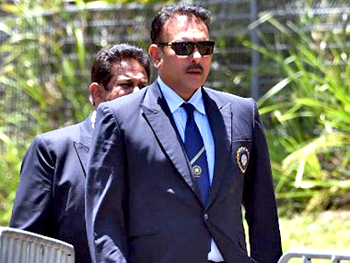 Mumbai, Jun 11: Sources close to the Board of Control for Cricket in India (BCCI) have revealed that Ravi Shastri, the team India director, has now been moved into position of coach for the team. Reportedly, he is set to become the highest paid coach in the world of cricket. The decision is likely to be formally announced at the conclusion of the Bangladesh tour.
Mumbai, Jun 11: Sources close to the Board of Control for Cricket in India (BCCI) have revealed that Ravi Shastri, the team India director, has now been moved into position of coach for the team. Reportedly, he is set to become the highest paid coach in the world of cricket. The decision is likely to be formally announced at the conclusion of the Bangladesh tour.
According to the Hindustan Times, BCCI’s hunt for a coach were ended when Virat Kohli insisted that he wanted Shastri to work with the team in that capacity rather than being a team director.
Shastri is poised to become the first Indian coach for team India after New Zealander John Wright was appointed in 2000, following which only foreigners were appointed to the post, the last of whom was Zimbabwean Duncan Fletcher. Fletcher’s contract terminated at the end of the ICC Cricket World Cup 2015.
Taking up a coaching role means Shastri will have to forgo his media commitments including commentary and presentations. Shastri was making about Rs 4 crore a year in that position and his role as coach is going to be even more lucrative with a Rs. 6.4 crore a year amount quoted.
Former coach Fletcher was being paid a handsome 4.2 crore by the BCCI. Fletcher’s stint with India was largely unsuccessful however Under his watch India endured Test-match whitewashes in Australia and England. India fans will hope that a coach from the country will reap better rewards.





Comments
Add new comment